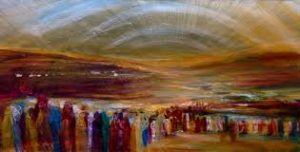 In the weeks leading up to Passover, I hesitate sending my husband to the grocery store for me. My priority is cleaning out my pantry of hametz and purchasing only the essentials we can use and finish immediately. A request for a red pepper, a package of cheese and half a loaf of fresh bread might return a bag of popcorn, a box of crackers and an enormous jar of pickles, “because we were out and this was a good deal.” I would argue we could live without pickles until Passover, but I digress.
In the weeks leading up to Passover, I hesitate sending my husband to the grocery store for me. My priority is cleaning out my pantry of hametz and purchasing only the essentials we can use and finish immediately. A request for a red pepper, a package of cheese and half a loaf of fresh bread might return a bag of popcorn, a box of crackers and an enormous jar of pickles, “because we were out and this was a good deal.” I would argue we could live without pickles until Passover, but I digress.
So I have learned to annotate my lists, anticipating what he might see and buy as he makes his way through the aisles looking for the items actually on the list. For example: Tortilla chips – 1 bag (I know it’s buy 2 get 1 free, but I only want 1 bag).
In this week’s parashah, Moses gathers together the nation of Israel for another set of instructions regarding building the Tabernacle.
And Moses assembled the entire assembly of the Children of Israel and said to them: “These are the things that the Lord commanded to do them.”
However, just before he relays to them their tasks, the commandment regarding Shabbat is restated:
For a period of six days, work may be done, but the seventh day shall be holy for you, a day of complete rest for the Lord; whoever does work on it shall be put to death. You shall not light fire in any of your dwellings on the Sabbath day.
Many commentators have explored the connection between the restatement of the commandment to observe the Sabbath and the building of the tabernacle. In fact, many of the categories of “work” from which we are forbidden were elucidated from the types of tasks that were required to build the mishkan. Moreover, as building the Tabernacle for God was a holy and sacred activity, some thought that perhaps it was necessary to reiterate that no labour supersedes the rest commanded for the seventh day.
After listening to Moses’ instructions, everyone dispersed and then:
Every man whose heart inspired him came and everyone who is generous and his spirit moved him brought the portion of the Lord for the work of the Tent of Meeting, for all its labour and for the garments of the holy.
From the collective, every individual contributed what was right for him. Not everyone did the same thing or gave the same amount, but every contribution and thus every individual was valued. When the individual is invested for a common cause – even if that investment is not equal in quantity – the group is stronger.
The children of Israel were building a sacred dwelling for God, a physical structure that would offer a concrete representation of God’s holy and eternal presence among them. The juxtaposition of Shabbat within this description teaches us that even without a physical structure to represent God, even without a Tabernacle or a Temple or perhaps even a synagogue, Shabbat can offer that same motivation for community and sustainability.
It doesn’t matter how every individual celebrates Shabbat – whether they light candles, have dinner with loved ones, go to synagogue or refrain from all electronics – the idea that the commitment to Shabbat exists among us as individuals ensures that the community as a whole is stronger.
The reiteration of the commandment of Shabbat is – for me- God’s way of reminding His people to remember the bigger picture. Their commitment to contributing whatever they can to the building of the Mishkan is essential and valuable, but the commandments that unify us as a people, without the physical structures, are irreplaceable.
As Ahad Ha-Am said, “More than the Jews have kept the Sabbath, the Sabbath has kept the Jews.”
And just like shopping before Passover, it’s about remembering the bigger picture and the main objective: Clear out the hametz.
And contribute, in any way you can, to what sustains us as a community and connects us to each other, to our heritage and to God.
Shabbat Shalom.












